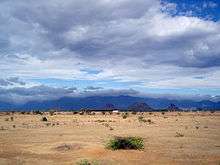Climate of Tamil Nadu


The Climate of Tamil Nadu, India is generally tropical and features fairly hot temperatures over the year except during the monsoon season.
History
Under the Köppen climate classification the greater part of Tamil Nadu falls under Tropical savanna climate and a smaller portions of the state falls under Humid subtropical climate; the climate of the state ranges from dry sub-humid to semi-arid. Tamil Nadu is heavily dependent on monsoon rains, and thereby is prone to droughts when the monsoons fail.
Seasons
Summer
The hot weather sets in and lasts until the middle of June. The highest temperature is often registered in May which is the hottest month in the state. The hot winds of the plains blow during April and May with an average velocity of 8–16 km/hour. These hot winds greatly affect human comfort during this season.
Winter
The cold weather commences early in October and comes to an end in the middle of January.The climate in the cold weather is pleasant. The days are bright and warm and the sun is not too hot.
As soon as the sun sets the temperature falls and the heat of the day yields place to a sharp bracing cold.
Monsoon
The state has three distinct periods of rainfall: advance rainfall ; the South West monsoon from June to September, with strong southwest winds; and the North East monsoon from October to December, with dominant northeast winds. The dry season is from feb to july.
The normal annual rainfall of the state is about 945 mm (37.2 in) of which 48% is through the North East monsoon,and 32% through the South West monsoon. Since the state is entirely dependent on rains for recharging its water resources, monsoon failures lead to acute water scarcity and severe drought.
Tamil Nadu is classified into seven aggro-climatic zones: north-east, north-west, west, southern, high rainfall, high altitude hilly,and Cauvery Delta (the most fertile agricultural zone). The table below shows the maximum and minimum temperatures that the state experiences in the plains and hills.
Tamil Nadu has rain during the monsoon season due to the south west trade winds which blow towards the northern hemisphere. Tamil Nadu receives rainfall in the winter season due to north-west trade winds.
Statistics
Temperature
| — | Winter (Jan – Feb) |
Summer (Mar – May) |
Monsoon (Jun – Sep) |
Post-monsoon (Oct – Dec) |
Year-round | ||||||||
|---|---|---|---|---|---|---|---|---|---|---|---|---|---|
| City | Jan | Feb | Mar | Apr | May | Jun | Jul | Aug | Sep | Oct | Nov | Dec | Avg |
| Chennai | |||||||||||||
| Coimbatore | |||||||||||||
| Madurai | |||||||||||||
Precipitation
|- | style="vertical-align: top;" |
| — | Winter (Jan – Feb) |
Summer (Mar – May) |
Monsoon 1 (Jun – Sep) |
Monsoon 2 (Oct – Dec) |
Year-round | ||||||||
|---|---|---|---|---|---|---|---|---|---|---|---|---|---|
| City | Jan | Feb | Mar | Apr | May | Jun | Jul | Aug | Sep | Oct | Nov | Dec | Total |
| Chennai | |||||||||||||
| Coimbatore | |||||||||||||
| Madurai | |||||||||||||
Disasters
Cyclones
2004 Asian Tsunami Disaster
Earthquakes
Template:No Earth quakes
Drought & Famine
See also
References
- 1 2 "Country Guide: India". BBC Weather. Retrieved 2007-03--. Check date values in:
|access-date=(help) - 1 2 "Weatherbase". Weatherbase. Retrieved 2007-03--. Check date values in:
|access-date=(help) - 1 2 "Wunderground". Weather Underground. Retrieved 2007-03--. Check date values in:
|access-date=(help) - 1 2 "Weather.com". The Weather Channel. Retrieved 2007-03--. Check date values in:
|access-date=(help)